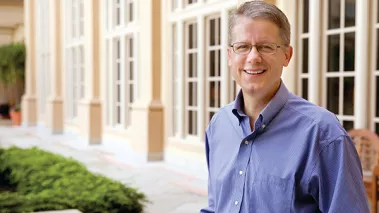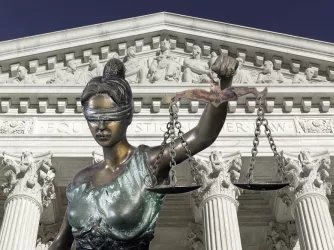Table of Contents
Nearly Six Years After Filing, UNC-Wilmington Professor’s First Amendment Lawsuit Heads to Trial

Bruce Ellefson / Facebook.com
Professor Mike Adams of the University of North Carolina Wilmington.
In April 2007, Professor Mike Adams of the University of North Carolina-Wilmington filed a federal lawsuit against his institution, alleging that he had been denied promotion in part due to political viewpoints he had expressed in columns written for non-university publications. Nearly six years and one successful appeal to the U.S. Court of Appeals for the Fourth Circuit later, a federal district court has ruled that Adams' First Amendment claim may proceed to trial.
Adams' April 2007 complaint, filed with the cooperation of the Alliance Defense Fund (now the Alliance Defending Freedom), accused UNC-Wilmington officials of violating his First Amendment rights by denying his promotion on account of his expression as a conservative columnist. Adams also alleged that he had suffered religious discrimination and an equal protection violation.
Three years later, in a March 2010 ruling, a federal district court rejected Adams' claim of First Amendment retaliation, finding that the columns constituted speech "made pursuant to his official duties" as a professor and were thus not protected by the First Amendment. The court reached its decision by relying on the Supreme Court's ruling in Garcetti v. Ceballos, 547 U.S. 410 (2006). In Garcetti, the Court ruled that public employees do not enjoy First Amendment protections when engaging in speech pursuant to their official duties. Applying Garcetti's holding to Adams' case, the district court determined that the columns could not be cited as grounds for retaliation in violation of the First Amendment.
From a faculty speech standpoint, the district court's ruling was very problematic, as I explained here on The Torch a few years back:
We here at FIRE found the district court's ruling against Adams deeply worrying. For one, we felt the facts provided significant support for Adams' First Amendment claim. But even more ominously, the district court's reliance on Garcetti made the ruling against Adams just the latest in a quickly-growing string of Garcetti-based defeats for public university faculty members. The problem with Garcetti is that in lessening First Amendment protections for public employees generally, it particularly impacts faculty members, whose speech in fulfilling teaching and research duties differs greatly from the speech of, say, district attorneys, police officers, or public administrators. Because while the government as employer may reasonably expect a significant amount of control over the public speech of district attorneys, that same amount of control over the scholarly research and teaching of public university faculty members is inappropriate and amounts to an infringement on academic freedom.
To address this exact concern, Justice Anthony Kennedy inserted a crucial caveat into the majority opinion he penned in Garcetti, writing:
There is some argument that expression related to academic scholarship or classroom instruction implicates additional constitutional interests that are not fully accounted for by this Court's customary employee-speech jurisprudence. We need not, and for that reason do not, decide whether the analysis we conduct today would apply in the same manner to a case involving speech related to scholarship or teaching.
Justice Kennedy thus specifically and explicitly declined to extend Garcetti's analysis to bear on cases involving the speech of public university faculty, reserving the question. Unfortunately, in application, Justice Kennedy's careful carve-out has been largely disregarded by courts, and Garcetti's impact on faculty speech has been so significant in recent years that the American Association of University Professors (AAUP) mounted a campaign to push back against Garcetti and what it has deemed "judicial hostility or indifference" to academic freedom.
Adams appealed the district court's ruling to the U.S. Court of Appeals for the Fourth Circuit. In support of Adams' appeal, FIRE joined an amici curiae brief with the AAUP and the Thomas Jefferson Center for the Protection of Free Expression, asking the Fourth Circuit to recognize Garcetti's inapplicability to Adams' situation.
Thankfully, the Fourth Circuit did just that. Reversing the district court's dismissal of Adams' claims, the court wrote that "the district court applied Garcetti without acknowledging, let alone addressing, the clear language in that opinion that casts doubt on whether the Garcetti analysis applies in the academic context of a public university." Continuing, the Fourth Circuit observed:
Put simply, Adams' speech was not tied to any more specific or direct employee duty than the general concept that professors will engage in writing, public appearances, and service within their respective fields. For all the reasons discussed above, that thin thread is insufficient to render Adams' speech "pursuant to [his] official duties" as intended by Garcetti.
[ . . . ]
Applying Garcetti to the academic work of a public university faculty member under the facts of this case could place beyond the reach of First Amendment protection many forms of public speech or service a professor engaged in during his employment. That would not appear to be what Garcetti intended, nor is it consistent with our long-standing recognition that no individual loses his ability to speak as a private citizen by virtue of public employment.
The case was remanded back to the district court for further proceedings.
Last Friday, March 22, Senior United States District Judge Malcolm J. Howard issued an order denying the UNC-Wilmington defendants' motion to dismiss, finding that Adams "has brought forth evidence from which a reasonable jury could find that his speech was a substantial or motivating factor in the decision to deny tenure to plaintiff."
As a result, Adams' case will now proceed to trial, nearly six years after his complaint was initially filed. Of course, we'll keep you posted here on The Torch about further developments in this case.
Recent Articles
FIRE’s award-winning Newsdesk covers the free speech news you need to stay informed.

LAWSUIT: Videographers sue to overturn National Parks Service arbitrary permit scheme

Supreme Court must halt unprecedented TikTok ban to allow review, FIRE argues in new brief to high court

Australia blocks social media for teens while UK mulls blasphemy ban


